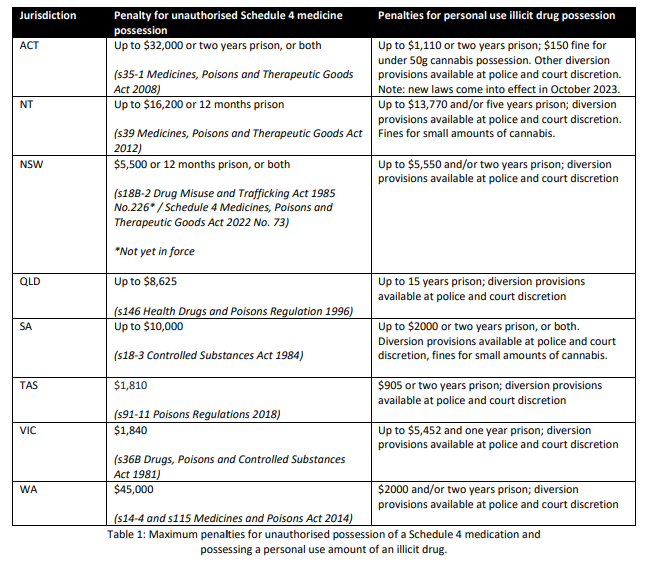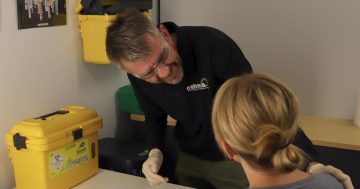
The Federal Government is working with state and territory authorities to crack down on single-use, disposable vapes. Photo: File.
In what has been hailed as the most significant smoking reform in decades, the Federal Government announced a ban on single-use, disposable vapes on Tuesday (2 May). It plans to work with state and territory authorities to end the sale of e-cigarettes in retail settings and stamp out the black market in illegal vaping.
In the ACT, which has the second-harshest penalties for possession of nicotine vapes, this could mean a maximum fine of $32,000 or a jail sentence of two years, or both, for possession of non-prescription e-cigarettes.
The finer details of the ban and how it will be carried out at the Territory level have not been determined, but these high penalties will likely be reserved for businesses found to be importing large quantities of non-prescription nicotine liquid.
While the retail sale of nicotine vapes has been illegal in Australia since 2021, non-nicotine vapes are still widely available in convenience stores and other retailers, and illegal importing has caused the black market to thrive. Under the new legislation, only prescription e-cigarettes can be imported.
Vapes will also require pharmaceutical-like packaging, reduced nicotine volumes, and restricted flavours and colours.
Nicotine vapes, which are classified as a Schedule 4 medication, carry a higher penalty for possession than illicit substances such as heroin, methamphetamines and cannabis in six Australian jurisdictions. In the ACT, the maximum penalty is up to $1110 or two years’ prison, though new laws will come into effect in October this year.

The maximum penalty for possession of unauthorised Schedule 4 medication (including nicotine vapes) in the ACT is higher than the penalty for possession of illicit drugs for personal use. Image: Australian Alcohol and Other Drugs Council.
The ACT Government has previously rolled out several legislative changes in an effort to regulate vaping, including stopping the sale of e-cigarettes from vending machines, enforcing restrictions on the sale of vaping products to under 18s, and extending therapeutic goods laws to take action against sole traders distributing illegal vapes.
“The ACT Government supports stronger action to reduce the use of vapes and will work closely with the Commonwealth to identify how the implementation of proposed national changes can be supported in the ACT,” an ACT Health spokesperson told Region.
“This will include identifying changes that may be required to ACT legislation and aligning complementary public communication campaigns.”
However, while they noted that the legislation currently in place has a maximum court-imposed penalty of a $32,000 fine, two years in prison or both, this high penalty is likely to be imposed on importers or sellers of large quantities of illegal vapes, rather than individuals caught possessing them.
“While significant penalties can apply for the possession of unauthorised Schedule 4 substances as defined by the Medicines, Poisons and Therapeutic Goods Act 2008, the ACT Government has no current intention of using this legislation to target individuals for the unauthorised personal use of vaping products.”
Nevertheless, the Government’s announcement has concerned some advocates of drug decriminalisation.
“The devil will be in the detail,” Canberra Alliance for Harm Minimisation and Advocacy (CAHMA) executive director Chris Gough told Region.
CAHMA provides support services and harm-reduction information to drug users and campaigns for legislative reform and destigmatisation of drug use.
“CAHMA has broad overarching philosophical concerns,” Mr Gough said. “At the same time that society has moved and made a conscious step to look at drug use as a health issue, we’re creating a system where possession of nicotine vapes carries this disproportionate penalty.”
Mr Gough said this was especially worrying as vapes were predominantly used by young people. “We’re stigmatising our youth,” he said. “Making vaping more restrictive than cigarettes shows we haven’t learned our history.
”When you do that, you create perverse incentives.”
As the first jurisdiction in Australia to pass drug decriminalisation laws and to introduce pill-testing facilities, the ACT has typically taken a different stance on drug use.
“In Canberra and the ACT, we have an enlightened view of drug use now,” Mr Gough said. “We’ve seen that work well with cannabis decriminalisation.
“At the same time, we’ve created a penalty for possession of vapes. This is diametrically opposed to a human rights approach.”
















